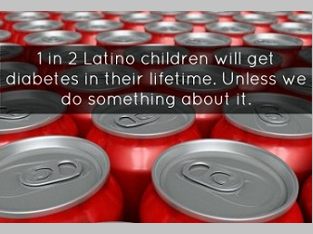This article appeared on the Latino Coalition for a Healthy California’s blog.
On May 12th, the California Assembly Health Committee will hear a new bill seeking to address one of the major health crises of our time. AB 1357 (Bloom) – The Children and Family Health Promotion Program – will create a dedicated revenue source enabling California to start to address the diabetes epidemic that is impacting our communities with devastating consequences. Comprehensive prevention efforts to reduce the diabetes epidemic in California will be supported through a 2 cent per ounce fee on sugary drinks that are distributed in the state.
California must get out in front of this preventable disease that is disproportionately affecting communities of color.
To “get” diabetes in our communities has become normal. As I travel across California where we host regional meetings from as far north as Eureka to El Centro in the South and all points in between, it saddens me when I ask those in the audience to raise their hands if someone in their immediate family has diabetes. It saddens me even more when I ask them if they have diabetes and they answer me, “Not yet” or “Todavia no.”
We cannot afford to wait any longer to take action.
Diabetes is already one of the leading causes of death for Latinos, African Americans, Native Americans, and Asian Pacific Islanders in our state. Over 43% of the Latinos, 40.3% Native Americans, 39.3% of African Americans and 38.7% of Asian Pacific Islanders, admitted to California hospitals in 2011 had diabetes. In some counties, the rate for Latinos is much higher (for example: Merced—49%; Yolo—48%; and Tulare and Imperial 46%)—when compared to the state average of 31% for the total population.
While we continue to make strides to increase nutrition education, raise awareness of healthier eating practices, and also of the need to increase physical activity, the rates of diabetes continue to climb. But we will not move the needle on diabetes until we fully prioritize this public health crisis through the development of a dedicated revenue source that truly reflects the investment and commitment that is needed to comprehensively curb this epidemic.
If we do nothing, it has already been predicted that 50% of Latino and African American children born since the year 2000 will develop type 2 diabetes during their lifetime. This is unacceptable!
The research that sugary beverages have a direct link with diabetes is incontrovertible; the links to obesity are even more established. We also know that the consumption of sugary drinks is a major driver of fatty liver disease, cardiovascular & heart disease, stroke, pancreatic cancer, and kidney disease. These health impacts are the result of beverages sweetened with either sugar or high fructose corn syrup.
Soda, energy and sports drinks, sweetened water, and fruit drinks—all drinks that would be subject to the fee—are the largest source of daily calories for adolescents in the US.
Moreover, sugar sweetened beverage consumption is highest among groups that have the highest risk of type 2 diabetes. Latinos, Native Americans, African Americans, and Asians & Pacific Islanders are even more vulnerable due to genetic factors that make our bodies even more sensitive to the overconsumption of sugar.
Consider that the economic consequences of diabetes in California have been estimated at over $24 billion, and that it has been calculated that economic burden of diabetes and prediabetes on the average person is estimated to be over $700 for every man, woman and child. This amount represents a hidden “tax” paid by all through higher insurance premiums.
It makes sense to place a fee on the biggest driver of this disease with the intent of investing these resources for prevention in the zip codes that exhibit the highest rates of disease.
Given the elevated economic costs of diabetes, it is incredible that, according to the California State Auditor, California’s per capita funding for diabetes prevention is one of the lowest in the nation. The California State Auditor’s office recommends that, “If state lawmakers desire Public Health to increase its efforts to address diabetes, they should consider providing state funding to aid in those efforts.”
AB 1357 will do just that.
The bill will enable the State to invest in communities disproportionately burdened by diseases related to the consumption of sugary drinks, especially type 2 diabetes.
Why are we picking on sugared water? Again, going back to the research, sugary drinks are the largest source of daily calories for children ages 2-18 in the U.S. Moreover, sugar sweetened beverage consumption is highest among groups that have the highest risk of type 2 diabetes. And when our children see 90% more ads for sugary drinks, we need to stand up and say enough! Ya basta!
The Latino Coalition for a Healthy California applauds the leadership of AB 1357’s authors Richard Bloom (AD 50), David Chiu (AD 17), and Anthony Rendon (AD 63) and proudly cosponsors this bill with Asian Pacific Partners for Empowerment, Advocacy, and Leadership; California Rural Indian Health Board; Council of Black Nurses; American Heart Association; Roots of Change/Public Health Institute; 100 Black Men of Orange County; 100 Black Men of Sacramento; California Primary Care Association; and the Los Angeles Urban League.
Please consider sending a letter of support to Assemblymember Bloom. For more information on how to do this, send us an e-mail at info@LCHC.org.
This issue will not go away. We are going to keep coming back until the day that we don’t have to bury our family members from this insidious disease that is so easily preventable.
Post originally featured on BeyondChron.org.

